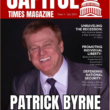Last night, CNBC’s Jim Cramer interviewed Senator Ted Kaufman about the problem of abusive short selling.
The Senator said: “We gotta have people feel that they’re getting a fair share and the market’s on the level…Clearly, every indication is that things went on in terms of short selling – both in Bear Stearns and Lehman Brothers, but in others – where abusive short selling drove the price down and legitimate people in the market got mauled.”
That is to say: rampant naked short selling (hedge funds illegally selling phantom stock to destroy public companies for profit) helped trigger the greatest financial disaster since the Great Depression.
This is a scandal of some magnitude. That is why members of Congress on both sides of the aisle have demanded that the Securities and Exchange Commission take action. But aside from Cramer, the media remains silent. And the SEC is hopeless.
Today the SEC held a special meeting to discuss short selling, and it was a whitewash. The focus was on reinstating the uptick rule, which is precisely where the short sellers wanted the focus to be. No talk of taking the necessary steps to wipe out illegal naked short selling.
Instead, the SEC recommended “caution” in cracking down on the criminals and suggested that new short selling rules (enacted in the midst of last September’s meltdown) are “working.” The new rules are basically the same as the old rules. Whereas previously short sellers were required to deliver shares within three days, now short sellers are really required to deliver the stock within three days.
This new regime, like the old regime, has several shortcomings. The first is that hedge funds can continue to sell unlimited amounts of phantom shares within the three-day window. During these three days, the stock price naturally tanks, at which point the hedge funds buy the cheapened stock and cover their “short sales” (which are really fake long sales, for no stock was ever borrowed) at a profit. The hedge funds repeat this process over and over, every three days, until the stock is in the single digits and the company’s lenders panic, cutting off credit.
The second shortcoming of the new regime is that hedge funds and their brokers are not, in fact, delivering stock within three days. The SEC’s list of companies whose stock was failing to deliver in excessive quantities shortened considerably after September, but that is partly because the short sellers had finished the job – the market was already destroyed. As the market recovered from its low in March, the abusive short selling resumed, and the number of companies on the list increased from 55 to around 75 companies today.
Given that nearly every one of those companies are targeted by hedge fund managers who are using a variety of other tricks (spreading false information, scheming to cut off companies’ access to credit, etc.) it is clear that the failures to deliver are not mere mechanical errors, but the result of strategic, illegal naked short selling. That is, at least 75 companies are getting raped every day and we remain witness to the bizarre spectacle of the sheriff publishing the list of victims while keeping the names of the perpetrators a secret.
Moreover, there are good reasons to suspect that the vast majority of naked short selling occurs in corners of the market (ex-clearing, desk trades; off-shore, etc.) that do not register in the SEC’s published data. The market has recovered some in recent weeks, but it seems just a matter of time before the shorts unleash another round of carnage.
There is only one way to prevent this from happening: force hedge funds and brokers to purchase or borrow stock before selling it. This seems simple enough, yet today’s meeting at the SEC suggests that officials remain captured by the hedge fund lobby, which used to insist that naked short selling never occurred, but now says that the very functioning of free markets depends on the SEC allowing naked short selling to occur.
To support this argument, the short sellers continue to haul out the same few professors who purport to show that naked short selling enhances “market liquidity.” In every case, the reports published by these professors have contained multitudes of cherry-picked statistics and calculations so erroneous that we are left to assume that the professors either slept through seventh grade math or realized at some later stage in life that there is benefit to be derived from spewing balderdash in service to Wall Street’s most powerful billionaires.
As Senator Kaufman put it last night, the short sellers and their professors argue “out of both sides of their mouth…they’re willing to throw any mud against the wall and see if it sticks.” The Senator added that he believes SEC commissioners buy this “market liquidity” nonsense – even as the Senate, the House, the American Chamber of Commerce, the leaders of the nation’s biggest banks, and all of the major stock exchanges have called for an end to naked short selling – simply because the commissioners previously denied the problem existed and now they “don’t want to admit they made a mistake.”
Perhaps the same can be said of some of the nation’s most “prominent” journalists, who churned out countless stories arguing that naked short selling does not occur (only “conspiracy theorists” see phantom stock, the journalists said), but who have been oddly silent on the issue ever since phantom stock helped bring about the near total evisceration of our financial system.
Cramer crusades against naked short selling, but he began doing so only after Deep Capture implicated him in a cover-up of the scandal. Never mind—I’m glad to have his support, forgiveness for past sins, etc. etc. But the rest of CNBC, a network over which Cramer wields considerable influence, utters not a word about naked short selling. Better to leave the reporting on the world’s most damaging financial crime to a “reporter” who says “Boohyah!” while pushing buttons that make clownish sound effects.
To allow one of CNBC’s more reputable journalists to report the facts would be to give the facts credence. And to do that would be to admit that CNBC royally screwed up by failing to report the story in the first place.
Same goes for The Wall Street Journal. I know there are reporters at the Journal who understand this issue and its importance. But how to report on it now? This is the newspaper that described Deep Capture reporter Patrick Byrne’s theories about naked short selling as a cross between “Where’s Waldo and the DaVinci Code.” This is a newspaper that not only vehemently denied that naked short selling was a problem, but published worshipful profiles of the short sellers most likely to have been committing the crime.
How can this newspaper now publish a story – a real investigative story that would show definitively that naked short selling is a very serious problem? The answer is, it’s hard to do without looking mighty stupid.
But The Journal needs to swallow its pride. There is too much at stake.
And what about that other newspaper of record – The New York Times? How about that paper’s top business columnist, Joe Nocera? He once told an audience of his media colleagues that “life’s too short” to investigate naked short selling. But he nonetheless found time to write countless articles denying that naked short selling is a problem and covering up other crimes committed by his short selling friends. What can Joe possibly say now? He could say, “Sorry.” But big time columnists don’t do that.
For reasons I cannot quite fathom, the rest of The New York Times staff remains silent, too. The only exception is the ever-befuddled Floyd Norris, who wrote a column last week stating that the new regulations seemed to have solved the naked short selling problem. That was different from his earlier contentions that there was no problem to be solved, but the latest column contained much of the familiar goofy-headed logic.
My favorite was Mr. Norris’s assurance that we don’t have to worry about naked short selling because if naked short sellers drive a stock low enough, somebody will step in to buy the company. I doubt most readers need this to be explained, but just in case, I’ll clarify – it is illegal for naked short sellers to drive a company’s stock price down to single digits so that it can be taken over by some corporate raider. It was illegal and cataclysmic that short sellers aired false rumors about Bear Stearns while selling 13 million phantom shares in the company – never mind that somebody stepped in and bought Bear Stearns after it had been mutilated.
Good grief…I know this is complicated, but one expects more from our top financial journalists. Alas, maybe it’s time to give up on the financial press. Maybe it’s time we call Oprah…Oprah could do better…
Yes, Oprah will understand.








Mark,
It looks like all the messages below your article have disappeared…
Submit your comments to the SEC here http://www.sec.gov/cgi-bin/ruling-comments?ruling=s70809&rule_path=/comments/s7-08-09&file_num=S7-08-09&action=Show_Form&title=Amendments%20to%20Regulation%20SHO
Dear All,
Earlier this morning we had a severe database bump that and lost all comments made to Deep Capture since May 3. Apologies to all who wrote comments during this period.
Judd is working hard to fix the problem.
Meantime, it is unlikely to happen again, so please don’t let this interrupt the discussion.
Cheers,
Mark Mitchell
Deep Capture
she has “made it a priority to evaluate the issue of short-selling regulation, and ensure that any future policies in this area are the result of a deliberate and thoughtful process.”
http://www.bloggingstocks.com/2009/05/06/sec-chief-says-crackdown-on-short-selling-is-a-priority/
In the last SEC discussion on naked shorting, they unanimously agreed it was good for the market as there was an unnatural imbalance where there were too many buy orders.
Here’s the transcript.
http://www.sec.gov/about/economic/shopilottrans091506.pdf
Dr. Byrne:
Come on, level with us. How did you get Cramer on board? What do you have on Cramer? Pictures of him in church saluting an American flag while standing beside a Republican? Or what?
http://news.prnewswire.com/ViewContent.aspx?ACCT=109&STORY=/www/story/05-06-2009/0005021042&EDATE=
This is a great post and it’s great to see the issue getting such exposure with real champions behind it like Sen. Kaufman. I wouldn’t be so quick to give Cramer credit for coming around or championing the cause, though. I think he’s being very disingenuous, if not deliberately misleading, by so closely linking NSS to the changes in the uptick rule as he does in this segment. It still smells like he’s covering for his hedge fund buddies and trying to cloud the issue while making it appear he’s on board. I take him to task a bit more on my blog at: http://bit.ly/175sF2
Updates with details on updated memo Wednesday from SEC’s ethics office)
By Sarah N. Lynch
Of DOW JONES NEWSWIRES
WASHINGTON (Dow Jones)–The Securities and Exchange Commission is actively looking for new ways to encourage whistleblowers at companies to come forward, but a key Republican senator is raising concerns about how the agency treats its own internal whistleblowers.
In a recent letter to SEC Chairman Mary Schapiro, Senate Finance Ranking Member Charles Grassley, R-Iowa, said he is concerned about an internal “Ethics NewsGram” memo posted on the SEC’s internal Web site.
The memo, titled “Loose Lips Sink Ships,” warns against disclosing nonpublic information without obtaining prior authorization from the commission. Nonpublic information, as defined in the memo, includes “all information” about an employee’s work at the SEC. Grassley said he fears the language in the memo is too broad, and may prevent staffers from speaking out if they have concerns.
“This kind of memo sends a chilling message to SEC employees,” said Grassley. “It shows we need to keep a close eye on what bureaucrats are doing at the SEC because it might not be consistent with the leadership’s commitment to reform and being more receptive to whistleblowers.”
The memo, which was distributed to employees on April 2, says they should consider all information to be nonpublic unless they “read it in the news or have clearance” from a supervisor. It also states that employees can’t discuss their work in front of outside visitors or even any other SEC employees who may “overhear your conversations in an SEC elevator, rest room, kitchen, snack bar, public restaurants, the metro, taxis, airports, and so on.”
“I am requesting that you give serious consideration to supplementing the April 2, 2009, memorandum and all future such memoranda with an explicit recognition of SEC employees’ whistleblower rights and an acknowledgment of the SEC’s responsibilities to respect and protect such disclosures,” Grassley wrote to Schapiro in response to the memo.
SEC spokesman John Nester declined to comment on the letter, but on Wednesday, the SEC’s ethics office updated the memo on the agency’s internal Web site to clarify that the rules on disclosure don’t trample the rights of whistleblowers.
“We would like to clarify that the discussion of these rules in this NewsGram does not, and was not intended to, apply in any way to another very important area of the law: employees’ whistleblower rights,” the updated memo reads. “You should not read our advice as in any way related to your rights to disclose waste, fraud, or abuse to the proper authorities.”
Grassley doesn’t sit on the Senate Banking Committee, which has jurisdiction over the SEC, but he has taken an active interest in the SEC’s enforcement staff and whistleblower issues there.
Several years ago, he launched a congressional investigation into allegations that former SEC staff attorney Gary Aguirre was fired for complaining that SEC enforcement officials had tried to block him from interviewing Morgan Stanley (MS) Chief Executive John Mack as part of his insider-trading investigation into the hedge-fund firm Pequot Capital Management. Aguirre claimed Mack received special treatment by SEC enforcement management. Neither Pequot nor Mack was ever ultimately charged with any wrongdoing.
Grassley, along with then-Republican Sen. Arlen Specter of Pennsylvania, eventually released a report in 2007 which faulted the SEC’s former inspector general for not vigorously investigating Aguirre’s claims of whistleblower retaliation.
The report made several recommendations, including a suggestion that the SEC draft a manual of procedures for conducting investigations and develop a plan within its office of the inspector general to ensure independence from agency management.
In April, Schapiro sent a letter to Grassley assuring him she would work toward implementing the suggestions made in the 2007 report. The SEC is supposed to report back to Grassley by Friday on its progress.
http://online.wsj.com/article/BT-CO-20090506-720297.html
Sorry folks, the lost comments are gone forever, and it’s my fault. Every day I delete the comments caught in the spam filter but apparently (I suspect) I accidentally deleted an entire page of non-spam comments instead. I’d hoped to recover them from our database backup, but it runs weekly and the latest one doesn’t include those erased.
Careful Judd, we’re building our case against shorting here.
Hoping the right eyes eventually see all of this.
Otherwise, good job!
lest we forget, you can short dozens of stocks or singles by going long head shares in stocks you dont dislike AND then selling index futures. is this going to be banned too?
p.s. Excuse me.
Furthermore, there are suggestions that chronic opioid administration may induce a state of immune tolerance, although Tramadol, in contrast to typical opioids may enhance immune function.
Also buy Tramadol no rx tramadol hcl 50 mg
Gentlemen:
STOP using the term NAKED SHORT SALE. Immediately! Purge it from yout public lexicon. Why?
(1) people’s eyes glaze over: if you have to explain it, it doesn’t work
(2) It serves the obduscator’s purposes
START using the term: COUNTERFEIT STOCK. People understand that.
Gentlemen:
STOP using the term NAKED SHORT SALE. Immediately! Purge it from yout public lexicon. Why?
(1) people’s eyes glaze over: if you have to explain it, it doesn’t work
(2) It serves the obfuscator’s purposes
START using the term: COUNTERFEIT STOCK. People understand that.
JR:
Absolutely right – it can only be a *short* if there is possession (buy or borrow) prior to the sale. Otherwise you are selling something you do not possess.
Sure it creates liquidity – if everyone went out and sold things they didn’t possess there would be a hell of lot of liquidity. The question is: where is the drain sucking up the excess liquid.
When will Congres and the SEC stop hedge funds from being a a vehicle for organized crime?